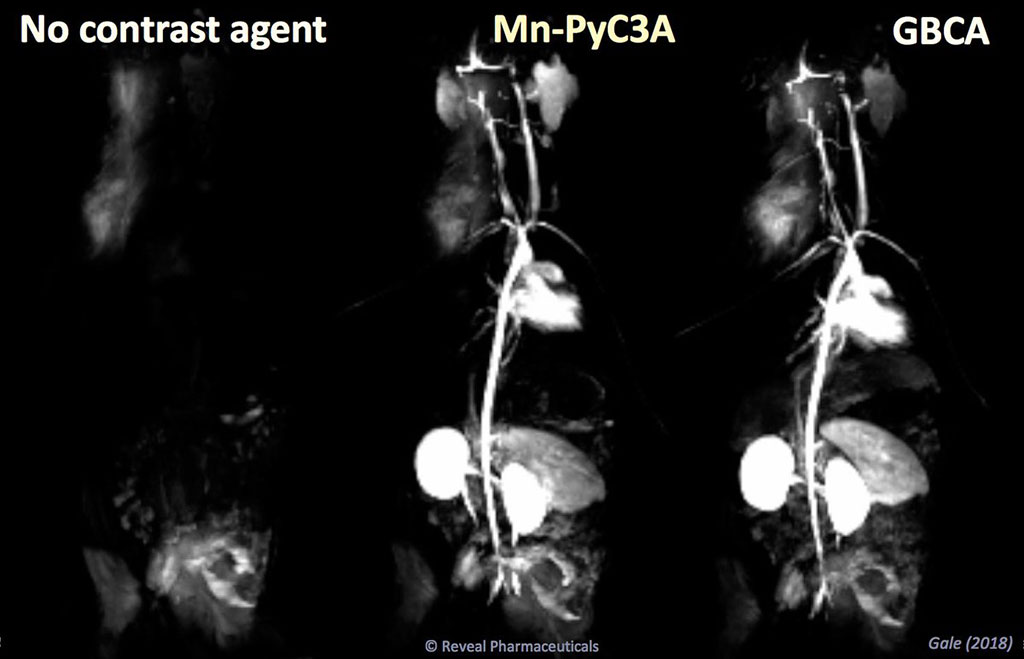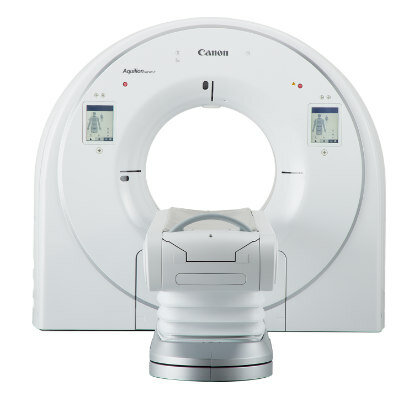Novel MRI Contrast Agent Swiftly Eliminated from Body
|
By MedImaging International staff writers Posted on 12 Jan 2021 |

Image: MRI manganese-based contrast agents are as efficient as gadolinium, but less toxic (Photo courtesy of Eric Gale/ MGH)
A new study suggests that a manganese (Mn) based magnetic resonance imaging (MRI) contrast agent could soon replace gadolinium-based contrast agents (GBCAs) as a non-toxic alternative.
Researchers at Massachusetts General Hospital (MGH; Boston, USA) and Harvard Medical School (HMS; Boston, MA, USA) conducted a study to compare the new contrast agent, Mn-PyC3A, to the older Mn-based contrast agent mangafodipir (Mn-DPDP), and to the GBCA gadoterate (Gd-DOTA). For the study, the researchers used simultaneous positron emission tomography (PET) and MRI (PET-MRI) to compare pharmacokinetics, in-vivo biodistribution, and whole-body elimination in a rat model.
The results revealed that while both Mn-PyC3A and Mn-DPDP are eliminated via mixed hepatobiliary and renal routes, a greater fraction of the Mn-PyC3A contrast agent was eliminated by renal filtration. Whole-body PET images showed that Mn-PyC3A was efficiently eliminated, whereas Mn-DPDP was retained throughout the body. The experimental data also showed significantly more efficient whole-body elimination of Mn-PyC3A than Gd-DOTA both one day and one week after injection. The study was published on October 30, 2020, in Investigative Radiology.
“This manganese-based contrast agent does everything a GBCA would do; this is obviously important for patients with chronic kidney disease and other forms of renal insufficiency that might require careful risk/benefit analysis before undergoing a GBCA-enhanced MRI,” said senior author biomedical engineer Eric Gale, PhD, of MGH and HMS, co-inventor of Mn-PyC3A. “But we can also envision giving Mn-PyC3A to any patient requiring a contrast-enhanced MRI. There are patients who require many GBCA-enhanced MRI examinations over the course of years for disease surveillance or screening.”
Efficient elimination of a contrast agent is critical for tissue health. Since Gadolinium is eliminated only from the kidneys, retention from GBCAs can cause nephrogenic systemic fibrosis, and it is also retained in the brain, bones, skin and other organs, even in patients with normal kidney function. Mn-PyC3A, on the other hand, is also eliminated from the liver, compensating for diminished renal function in kidney patients and ensuring a more rapid and complete elimination.
Related Links:
Massachusetts General Hospital
Harvard Medical School
Researchers at Massachusetts General Hospital (MGH; Boston, USA) and Harvard Medical School (HMS; Boston, MA, USA) conducted a study to compare the new contrast agent, Mn-PyC3A, to the older Mn-based contrast agent mangafodipir (Mn-DPDP), and to the GBCA gadoterate (Gd-DOTA). For the study, the researchers used simultaneous positron emission tomography (PET) and MRI (PET-MRI) to compare pharmacokinetics, in-vivo biodistribution, and whole-body elimination in a rat model.
The results revealed that while both Mn-PyC3A and Mn-DPDP are eliminated via mixed hepatobiliary and renal routes, a greater fraction of the Mn-PyC3A contrast agent was eliminated by renal filtration. Whole-body PET images showed that Mn-PyC3A was efficiently eliminated, whereas Mn-DPDP was retained throughout the body. The experimental data also showed significantly more efficient whole-body elimination of Mn-PyC3A than Gd-DOTA both one day and one week after injection. The study was published on October 30, 2020, in Investigative Radiology.
“This manganese-based contrast agent does everything a GBCA would do; this is obviously important for patients with chronic kidney disease and other forms of renal insufficiency that might require careful risk/benefit analysis before undergoing a GBCA-enhanced MRI,” said senior author biomedical engineer Eric Gale, PhD, of MGH and HMS, co-inventor of Mn-PyC3A. “But we can also envision giving Mn-PyC3A to any patient requiring a contrast-enhanced MRI. There are patients who require many GBCA-enhanced MRI examinations over the course of years for disease surveillance or screening.”
Efficient elimination of a contrast agent is critical for tissue health. Since Gadolinium is eliminated only from the kidneys, retention from GBCAs can cause nephrogenic systemic fibrosis, and it is also retained in the brain, bones, skin and other organs, even in patients with normal kidney function. Mn-PyC3A, on the other hand, is also eliminated from the liver, compensating for diminished renal function in kidney patients and ensuring a more rapid and complete elimination.
Related Links:
Massachusetts General Hospital
Harvard Medical School
Latest MRI News
- Low-Cost Whole-Body MRI Device Combined with AI Generates High-Quality Results
- World's First Whole-Body Ultra-High Field MRI Officially Comes To Market
- World's First Sensor Detects Errors in MRI Scans Using Laser Light and Gas
- Diamond Dust Could Offer New Contrast Agent Option for Future MRI Scans
- Combining MRI with PSA Testing Improves Clinical Outcomes for Prostate Cancer Patients
- PET/MRI Improves Diagnostic Accuracy for Prostate Cancer Patients
- Next Generation MR-Guided Focused Ultrasound Ushers In Future of Incisionless Neurosurgery
- Two-Part MRI Scan Detects Prostate Cancer More Quickly without Compromising Diagnostic Quality
- World’s Most Powerful MRI Machine Images Living Brain with Unrivaled Clarity
- New Whole-Body Imaging Technology Makes It Possible to View Inflammation on MRI Scan
- Combining Prostate MRI with Blood Test Can Avoid Unnecessary Prostate Biopsies
- New Treatment Combines MRI and Ultrasound to Control Prostate Cancer without Serious Side Effects
- MRI Improves Diagnosis and Treatment of Prostate Cancer
- Combined PET-MRI Scan Improves Treatment for Early Breast Cancer Patients
- 4D MRI Could Improve Clinical Assessment of Heart Blood Flow Abnormalities
- MRI-Guided Focused Ultrasound Therapy Shows Promise in Treating Prostate Cancer
Channels
Radiography
view channel
Novel Breast Imaging System Proves As Effective As Mammography
Breast cancer remains the most frequently diagnosed cancer among women. It is projected that one in eight women will be diagnosed with breast cancer during her lifetime, and one in 42 women who turn 50... Read more
AI Assistance Improves Breast-Cancer Screening by Reducing False Positives
Radiologists typically detect one case of cancer for every 200 mammograms reviewed. However, these evaluations often result in false positives, leading to unnecessary patient recalls for additional testing,... Read moreUltrasound
view channel.jpg)
Diagnostic System Automatically Analyzes TTE Images to Identify Congenital Heart Disease
Congenital heart disease (CHD) is one of the most prevalent congenital anomalies worldwide, presenting substantial health and financial challenges for affected patients. Early detection and treatment of... Read more
Super-Resolution Imaging Technique Could Improve Evaluation of Cardiac Conditions
The heart depends on efficient blood circulation to pump blood throughout the body, delivering oxygen to tissues and removing carbon dioxide and waste. Yet, when heart vessels are damaged, it can disrupt... Read more
First AI-Powered POC Ultrasound Diagnostic Solution Helps Prioritize Cases Based On Severity
Ultrasound scans are essential for identifying and diagnosing various medical conditions, but often, patients must wait weeks or months for results due to a shortage of qualified medical professionals... Read moreNuclear Medicine
view channel
New PET Biomarker Predicts Success of Immune Checkpoint Blockade Therapy
Immunotherapies, such as immune checkpoint blockade (ICB), have shown promising clinical results in treating melanoma, non-small cell lung cancer, and other tumor types. However, the effectiveness of these... Read moreNew PET Agent Rapidly and Accurately Visualizes Lesions in Clear Cell Renal Cell Carcinoma Patients
Clear cell renal cell cancer (ccRCC) represents 70-80% of renal cell carcinoma cases. While localized disease can be effectively treated with surgery and ablative therapies, one-third of patients either... Read more
New Imaging Technique Monitors Inflammation Disorders without Radiation Exposure
Imaging inflammation using traditional radiological techniques presents significant challenges, including radiation exposure, poor image quality, high costs, and invasive procedures. Now, new contrast... Read more
New SPECT/CT Technique Could Change Imaging Practices and Increase Patient Access
The development of lead-212 (212Pb)-PSMA–based targeted alpha therapy (TAT) is garnering significant interest in treating patients with metastatic castration-resistant prostate cancer. The imaging of 212Pb,... Read moreGeneral/Advanced Imaging
view channelBone Density Test Uses Existing CT Images to Predict Fractures
Osteoporotic fractures are not only devastating and deadly, especially hip fractures, but also impose significant costs. They rank among the top chronic diseases in terms of disability-adjusted life years... Read more
AI Predicts Cardiac Risk and Mortality from Routine Chest CT Scans
Heart disease remains the leading cause of death and is largely preventable, yet many individuals are unaware of their risk until it becomes severe. Early detection through screening can reveal heart issues,... Read moreImaging IT
view channel
New Google Cloud Medical Imaging Suite Makes Imaging Healthcare Data More Accessible
Medical imaging is a critical tool used to diagnose patients, and there are billions of medical images scanned globally each year. Imaging data accounts for about 90% of all healthcare data1 and, until... Read more
Global AI in Medical Diagnostics Market to Be Driven by Demand for Image Recognition in Radiology
The global artificial intelligence (AI) in medical diagnostics market is expanding with early disease detection being one of its key applications and image recognition becoming a compelling consumer proposition... Read moreIndustry News
view channel
Hologic Acquires UK-Based Breast Surgical Guidance Company Endomagnetics Ltd.
Hologic, Inc. (Marlborough, MA, USA) has entered into a definitive agreement to acquire Endomagnetics Ltd. (Cambridge, UK), a privately held developer of breast cancer surgery technologies, for approximately... Read more
Bayer and Google Partner on New AI Product for Radiologists
Medical imaging data comprises around 90% of all healthcare data, and it is a highly complex and rich clinical data modality and serves as a vital tool for diagnosing patients. Each year, billions of medical... Read more



















